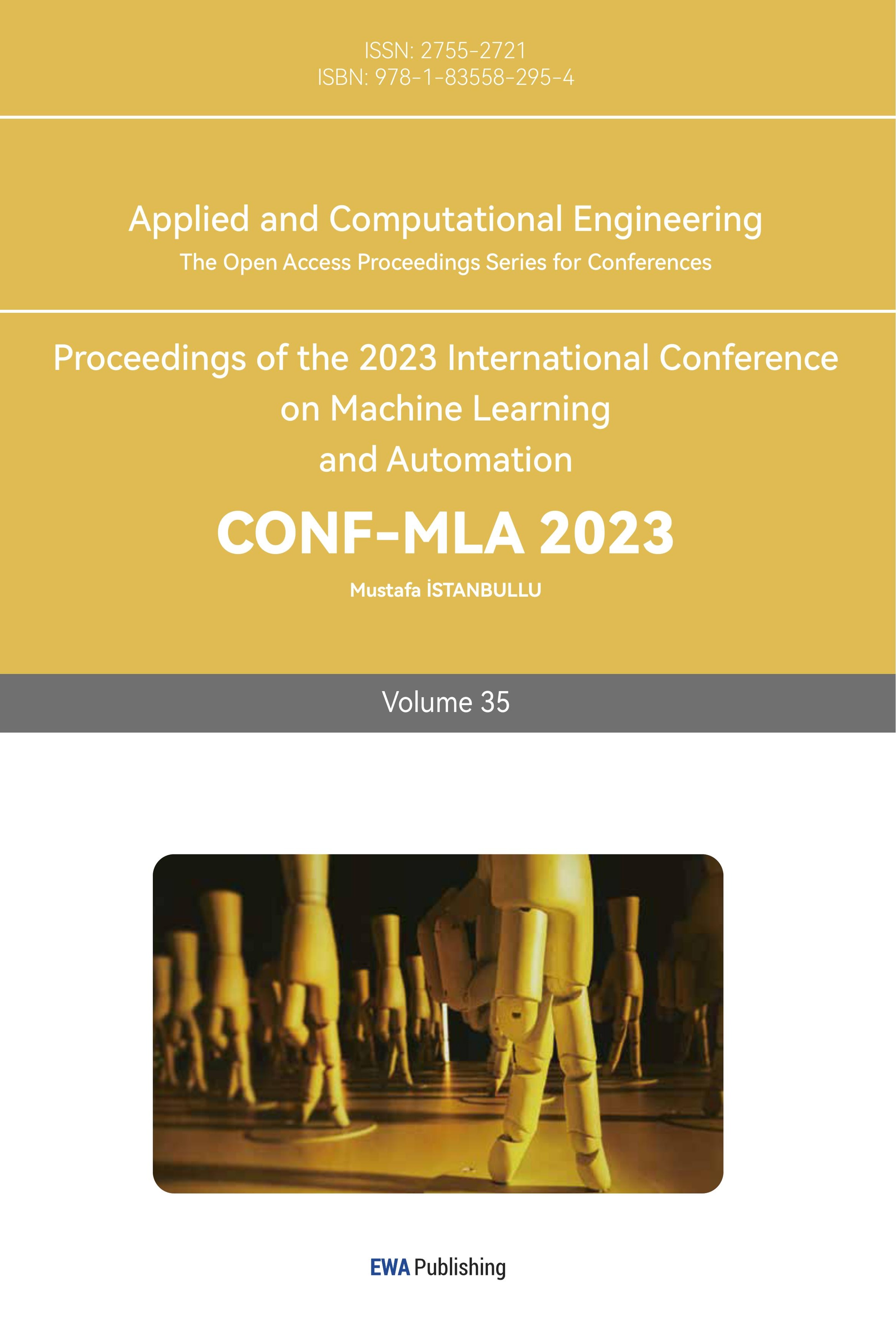References
[1]. Fraiwan M and Khasawneh 2023 A Review of ChatGPT Applications in Education, Marketing, Software Engineering, and Healthcare: Benefits, Drawbacks, and Research Directions arXiv:2305.00237 [cs.CY]
[2]. Jiang Y C Li X Luo H Yin S and Kaynak O 2022 Quo vadis artificial intelligence? (Discover Artificial Intelligence 2(1), 4)
[3]. Marcus G Rossi F and Veloso M 2016 Beyond the turing test(Ai Magazine 37(1) 3-4)
[4]. Tapalova O and Zhiyenbayeva N 2022 Artificial Intelligence in Education: AIEd for Personalised Learning Pathways (Electronic Journal of e-Learning 20(5) 639-653)
[5]. Kumar V and Boulanger D 2020 Explainable Automated Essay Scoring: Deep Learning Really Has Pedagogical Value (Frontiers in Education 2020 5)
[6]. Opara E Mfon-Ette Theresa A and Aduke T C 2023 ChatGPT for teaching, learning and research: Prospects and challenges (Glob Acad J Humanit Soc Sci 5)
[7]. Open AI 2023 GPT-4 Technical Report arXiv:2303.08774 [cs.CL]
[8]. Mhlanga D 2023 Open AI in education, the responsible and ethical use of ChatGPT towards lifelong learning (Education, the Responsible and Ethical Use of ChatGPT Towards Lifelong Learning)
[9]. Gilson A Safranek C Huang T Socrates V Chi L Taylor R A and Chartash D 2022 How well does ChatGPT do whentaking the medical licensing exams? The Implications oflarge language models for medical education and knowledgeassessment (medRxiv: 2022-12)
[10]. Rudolph J Tan S and Tan S 2023 ChatGPT: Bullshit spewer or the end of traditional assessments in higher education? (Journal of Applied Learning and Teaching 6(1))
[11]. Tapalova O and Zhiyenbayeva N 2022 Artificial Intelligence in Education: AIEd for Personalised Learning Pathways (Electronic Journal of e-Learning 20(5) 639-653)
[12]. Williamson B and Eynon R 2020 Historical threads, missing links, and future directions in AI in education (Learning, Media and Technology 45(3) 223-235)
[13]. Zhai X 2022 ChatGPT user experience: Implications for education
[14]. Bulqiyah S Mahbub M and Nugraheni D A 2021 Investigating Writing Difficulties in Essay Writing: Tertiary Students' Perspectives (English Language Teaching Educational Journal 4(1) 61-73)
Cite this article
Liu,Z. (2024). ChatGPT - A new milestone in the field of education. Applied and Computational Engineering,35,129-133.
Data availability
The datasets used and/or analyzed during the current study will be available from the authors upon reasonable request.
Disclaimer/Publisher's Note
The statements, opinions and data contained in all publications are solely those of the individual author(s) and contributor(s) and not of EWA Publishing and/or the editor(s). EWA Publishing and/or the editor(s) disclaim responsibility for any injury to people or property resulting from any ideas, methods, instructions or products referred to in the content.
About volume
Volume title: Proceedings of the 2023 International Conference on Machine Learning and Automation
© 2024 by the author(s). Licensee EWA Publishing, Oxford, UK. This article is an open access article distributed under the terms and
conditions of the Creative Commons Attribution (CC BY) license. Authors who
publish this series agree to the following terms:
1. Authors retain copyright and grant the series right of first publication with the work simultaneously licensed under a Creative Commons
Attribution License that allows others to share the work with an acknowledgment of the work's authorship and initial publication in this
series.
2. Authors are able to enter into separate, additional contractual arrangements for the non-exclusive distribution of the series's published
version of the work (e.g., post it to an institutional repository or publish it in a book), with an acknowledgment of its initial
publication in this series.
3. Authors are permitted and encouraged to post their work online (e.g., in institutional repositories or on their website) prior to and
during the submission process, as it can lead to productive exchanges, as well as earlier and greater citation of published work (See
Open access policy for details).
References
[1]. Fraiwan M and Khasawneh 2023 A Review of ChatGPT Applications in Education, Marketing, Software Engineering, and Healthcare: Benefits, Drawbacks, and Research Directions arXiv:2305.00237 [cs.CY]
[2]. Jiang Y C Li X Luo H Yin S and Kaynak O 2022 Quo vadis artificial intelligence? (Discover Artificial Intelligence 2(1), 4)
[3]. Marcus G Rossi F and Veloso M 2016 Beyond the turing test(Ai Magazine 37(1) 3-4)
[4]. Tapalova O and Zhiyenbayeva N 2022 Artificial Intelligence in Education: AIEd for Personalised Learning Pathways (Electronic Journal of e-Learning 20(5) 639-653)
[5]. Kumar V and Boulanger D 2020 Explainable Automated Essay Scoring: Deep Learning Really Has Pedagogical Value (Frontiers in Education 2020 5)
[6]. Opara E Mfon-Ette Theresa A and Aduke T C 2023 ChatGPT for teaching, learning and research: Prospects and challenges (Glob Acad J Humanit Soc Sci 5)
[7]. Open AI 2023 GPT-4 Technical Report arXiv:2303.08774 [cs.CL]
[8]. Mhlanga D 2023 Open AI in education, the responsible and ethical use of ChatGPT towards lifelong learning (Education, the Responsible and Ethical Use of ChatGPT Towards Lifelong Learning)
[9]. Gilson A Safranek C Huang T Socrates V Chi L Taylor R A and Chartash D 2022 How well does ChatGPT do whentaking the medical licensing exams? The Implications oflarge language models for medical education and knowledgeassessment (medRxiv: 2022-12)
[10]. Rudolph J Tan S and Tan S 2023 ChatGPT: Bullshit spewer or the end of traditional assessments in higher education? (Journal of Applied Learning and Teaching 6(1))
[11]. Tapalova O and Zhiyenbayeva N 2022 Artificial Intelligence in Education: AIEd for Personalised Learning Pathways (Electronic Journal of e-Learning 20(5) 639-653)
[12]. Williamson B and Eynon R 2020 Historical threads, missing links, and future directions in AI in education (Learning, Media and Technology 45(3) 223-235)
[13]. Zhai X 2022 ChatGPT user experience: Implications for education
[14]. Bulqiyah S Mahbub M and Nugraheni D A 2021 Investigating Writing Difficulties in Essay Writing: Tertiary Students' Perspectives (English Language Teaching Educational Journal 4(1) 61-73)









